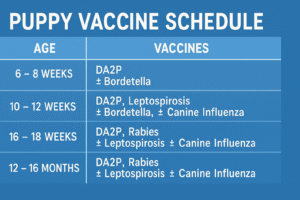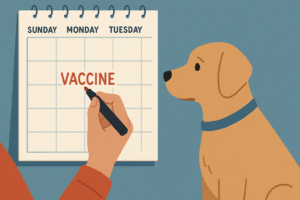What Is a Puppy Vaccination Schedule?
A puppy vaccination schedule is a step-by-step timeline that helps protect your puppy from serious diseases like parvovirus, distemper, hepatitis, and rabies. Puppies have developing immune systems, so timely vaccines are vital for lifelong protection.
When puppies are born, they inherit antibodies from their mother’s milk, but these fade within weeks. Vaccines “teach” the puppy’s immune system how to fight diseases safely — long before exposure in the real world.
Core vs. Non-Core Vaccines
-
Core vaccines: Essential for all dogs (e.g., DHPP/DA2PP, rabies).
-
Non-core vaccines: Recommended based on lifestyle, region, or exposure risk (e.g., Bordetella, Leptospirosis, Lyme).
Vaccines protect not only your puppy but also the wider community of pets they interact with.
Puppy Vaccine Schedule by Age (Week-by-Week Chart)
Below is the typical puppy vaccination schedule recommended by veterinarians. Always confirm the exact plan with your local vet.
| Puppy Age | Vaccine(s) | Purpose |
|---|---|---|
| 6–8 weeks | DHPP (1st dose), Bordetella (optional) | Begins protection against distemper, hepatitis, parvovirus, parainfluenza |
| 10–12 weeks | DHPP (2nd dose), Leptospirosis (optional) | Boosts immune response |
| 14–16 weeks | DHPP (3rd dose), Rabies | Full initial immunity; rabies required by law in most areas |
| 12–16 months | DHPP booster, Rabies booster | Strengthens long-term protection |
| Annually | Bordetella, Leptospirosis, Influenza (based on lifestyle) | Ongoing immunity |
💡 Tip: Ask your vet for a puppy vaccination record card — it helps you track shots and plan boosters easily.

Core Vaccines Every Puppy Needs
These are the must-have vaccines for all puppies, regardless of breed or lifestyle.
DHPP / DA2PP (5-in-1 Vaccine for Puppies)
Also called the Distemper-Parvo or 5-in-1 vaccine, this protects against:
-
Distemper – A deadly virus affecting the nervous system.
-
Adenovirus (Hepatitis) – Causes severe liver damage.
-
Parvovirus – Leads to vomiting, diarrhea, and dehydration in puppies.
-
Parainfluenza – A respiratory infection that spreads easily.
Rabies Vaccine
A legal requirement in most countries. It protects your dog and prevents transmission of this fatal disease to humans and other pets.
According to the American Kennel Club (AKC), most states require rabies vaccines at 12–16 weeks, followed by boosters every 1–3 years.
Optional (Non-Core) Puppy Vaccines
Depending on where you live and your puppy’s activities, your vet may suggest additional vaccines:
Bordetella (Kennel Cough)
Recommended for dogs that attend daycare, training classes, or grooming salons.
Leptospirosis (Lepto Shot)
Protects against bacteria spread by wildlife or contaminated water — ideal for outdoor dogs.
Lyme Disease Vaccine
Essential for dogs living in tick-heavy areas or rural environments.
Canine Influenza Vaccine
Helps prevent respiratory infections, especially in social or boarding environments.
Puppy Booster Schedule and Annual Dog Vaccines
After the initial puppy series, your dog will need booster shots to stay protected.
| Dog Age | Vaccine(s) | Frequency |
|---|---|---|
| 1 year | DHPP + Rabies booster | Once |
| Annually or every 3 years | Rabies (per local law) | 1–3 years |
| Annually | Bordetella, Lepto, Canine Influenza | 1 year |
💡 Tip: Set reminders in your phone or pet health app to keep track of booster schedules.

What to Expect During a Puppy’s Vaccination Appointment
-
Before the visit: Bring your puppy’s medical history or breeder records.
-
During the visit: The vet will examine your puppy’s temperature, heart rate, and general health before giving shots.
-
After the visit: Mild side effects like sleepiness or slight swelling at the injection site are normal.
When to Call Your Vet
Contact your vet immediately if you notice:
-
Vomiting or diarrhea
-
Facial swelling or hives
-
Difficulty breathing
-
Persistent lethargy
Reference: PetMD – Dog Vaccination Guide
Common Puppy Vaccination Mistakes & How to Avoid Them
1. Skipping Booster Shots
Missing a booster can weaken immunity and leave your puppy vulnerable. Always follow your vet’s full series.
2. Taking Puppies Out Too Early
Avoid dog parks or public areas until 2 weeks after the final vaccination.
3. Confusing Vaccine Names
DHPP, DAPP, DA2PP, and DHLPP all refer to similar core vaccines with slight variations. Ask your vet to explain which one your pup receives.
4. Not Updating Vaccine Records
Keep all receipts and vaccination cards. They’re essential for boarding, grooming, and travel.
Expert Tips to Keep Your Puppy Safe and Protected
-
Schedule all vet visits in advance to avoid delays.
-
Ask about combination vaccines (like 5-in-1) to reduce injection numbers.
-
Track vaccinations using a pet health app or notebook.
-
Keep your puppy indoors or in clean areas until fully immunized.
FAQs About Puppy Vaccination Schedule
Q1: When do puppies get their first shots?
Usually between 6 and 8 weeks old, once maternal antibodies start to decline.
Q2: How many rounds of shots do puppies need?
Most puppies need 3–4 rounds of core vaccines, spaced 3–4 weeks apart.
Q3: What is the 5-in-1 vaccine for puppies?
It’s a combination of Distemper, Adenovirus, Parvovirus, Parainfluenza, and sometimes Leptospirosis.
Q4: When is a puppy fully vaccinated?
Two weeks after the final vaccine dose, usually around 16–18 weeks of age.
Q5: How often do dogs need rabies shots?
After the first year, every 1–3 years, depending on your state’s law and vaccine type.
Q6: Do dogs need vaccines every year?
Core vaccines often last 3 years, while others like Bordetella or Lepto need annual boosters.
Related Guides on PetWiseTips
Conclusion: Protect Your Puppy with the Right Vaccination Plan
Following a clear puppy vaccination schedule keeps your pet healthy, confident, and ready for adventures.
Start vaccines early, stay on top of boosters, and work closely with your vet to adjust the plan based on your puppy’s lifestyle.
🐶 Next Step: Download the Free Puppy Vaccination Checklist PDF (add CTA or lead magnet here).


